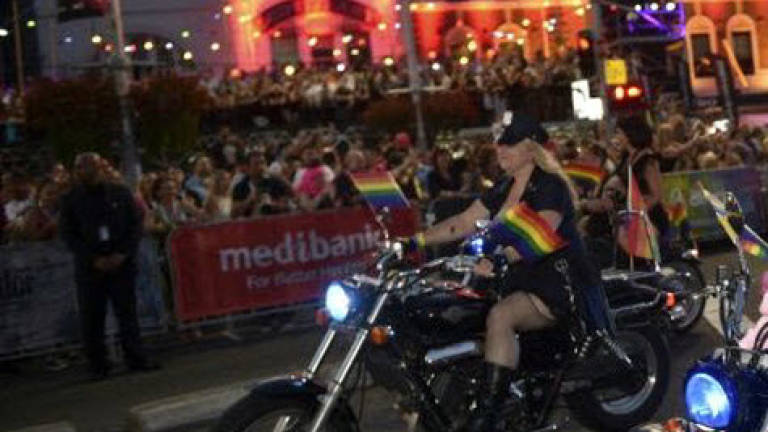Sydney's Mardi Gras: colourful pride born from a night of violence

FORTY years ago a group of gay and lesbian activists took to the Sydney streets for a night of celebration following a day of political protest, but police intervened, brutally beating dozens of partygoers.
The demonstrators were outed by the media, publicly shamed amid a climate of severe oppression and prejudice.
In what seemed inconceivable at the time, out of the violence would emerge one of the world's largest street parties: Sydney's Gay and Lesbian Mardi Gras, which celebrates its 40th anniversary on Saturday.
"We had this night ... that started out as a celebration and ended up as a vicious violent riot," Kate Rowe, who was among the original activists, told AFP.
"What that did — in terms of Australian history, in terms of gay rights — instead of oppressing us, it actually acted as a catalyst for where we are today," added Rowe, who is a member of a group known as the "78ers".
It was June 24, 1978, and the day's activities were planned to commemorate the Stonewall riots in New York, which were sparked nine years earlier by a police raid on a gay club.
"Out of the bars and into the streets!", was the cry from the Sydney crowds that night, some dressed brightly in costume to celebrate the occasion. For others, it was a disguise to conceal their identity.
Rowe, who was 27 and came out as gay that day, recalls up to 1,000 people on the street as Sydney's night owls joined the celebrations, before an overzealous New South Wales police force stepped in.
"I got bashed and thrown into the paddy wagon (police van), it was very, very frightening. I'd never known violence like that before," she said.
Some of the police officers were heavy-set and had removed their names from their uniforms, she recalled.
"And most of them you could smell alcohol," she added.
Newspapers, including the flagship Sydney Morning Herald, published the names, professions and addresses of those arrested, compounding the trauma by outing people to their family and employers, with some losing their jobs.
'The situation was dire'
The years of activism leading up to the first Mardi Gras have been recreated in a television movie "Riot", which was screened by national broadcaster ABC last week.
It depicted a cauldron of political thought bubbling in 1970s Australia among gay and lesbian activists, informed by a range of movements, including student activism, women's liberation and worker's rights.
Their many layers of protest fought for attention under the weight of persistent persecution.
The film portrayed an unjust 1970s Australia, where police harassment was constant, coming out meant putting your family and your job on the line, lesbian mothers battled difficult custody cases and homophobia stoked violence, with gay men beaten and young homosexuals attempting suicide.
"The situation was dire," 78er Ken Davis told AFP. "(It) was very difficult because sex between men was illegal in all states and territories, public affection between women was illegal."
It was not until 1984 that male homosexuality was decriminalised in New South Wales, years later for some states.
Davis described the first Mardi Gras as a "watershed" for civil rights in Australia, with students, women's organisations and trade unions viewing the night as a "threshold issue about political rights as well as lesbian and gay rights".
"It opened up a really big set of questions about police power and the right of people to demonstrate peacefully," Davis added.
Platform for protest
Last year about 250,000 people attended the Mardi Gras with the event getting bigger each year, as it attempts to balance its commercial success with its activist roots.
This year American superstar and gay icon Cher headlines the event.
"Perhaps Mardi Gras is like a Robin Hood now," Mardi Gras chief executive Terese Casu told AFP.
"We are a business, we are much more corporate than what we used to be, but what we can do is provide leadership and support for those other small groups of protest."
In 2016, the New South Wales parliament, the state police and the Sydney Morning Herald apologised for their treatment of the 78ers, some 38 years after the violent crackdown. Most, but not all, of the charges against activists were dropped.
And last year Australia voted to legalise gay marriage, with many lauding early activists for their contribution to the historic change.
Davis acknowledged there had been victories, but said there was still a raft of gay, lesbian and gender issues impacting public life that needed greater attention.
Mardi Gras today, he said, had the potential to provide a creative platform to draw attention to many of Australia's "big issues", like indigenous rights or refugee welfare.
"I think there is value in having a satirical night where the powers that be are under some sort of critique in a humourous way — and that is what makes Mardi Gras different." — AFP